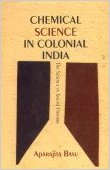The book, a narrative of the growth of chemical sciences during the colonial period, is authored by a trained analytical chemist whose work presents an insider’s view on the subject. The author aims at presenting the institutional developments in chemical sciences during the colonial period with a view to outlining the complexities of the East West interaction in scientific knowledge. There are seven chapters in the book and an epilogue. The introduction and the second chapter give details of Indian achievements in chemical and allied sciences and technologies over the centuries. Starting from Rasayana and tantra schools in the Indian tradition, the author lists seminal treatises on the subject in Sanskrit demonstrating how at different points in time, the alchemists, Tantric and the Buddhists have engaged in studies on preparation and use of chemical substances like sulphur and mercury These developments also contributed to new medical formula as recorded in texts like Rasaratnasamuchaya of the fourteenth century.
The author then describes the developments during the Islamic period in terms of the contributions of Islamic physicians. Parallel to the presentation of key works, Basu also gives details of technological innovations of each period in arts, crafts, dyeing and jewellery that embodied knowledge of chemical substances and processes.
With the arrival of European visitors, the author notes, an interesting phase begins. Coming from a situation where chemical sciences were not so well developed because of its weak connection to Industrialisation in their home country, British officials took keen interest in the methods and approach of Indian chemical science at various levels and have surveyed the resources in this land. They have tried to improvise existing techniques and gradually facilitated the move to mass production of chemical material. Basu argues how British officials found the furnaces and technologies widely used by artisan communities in India to be inadequate though chemical sciences in their own country was far less developed. However, with the introduction of English education, Indians inspired by new inputs from Europe for scientific knowledge formed societies of scientific learning.

